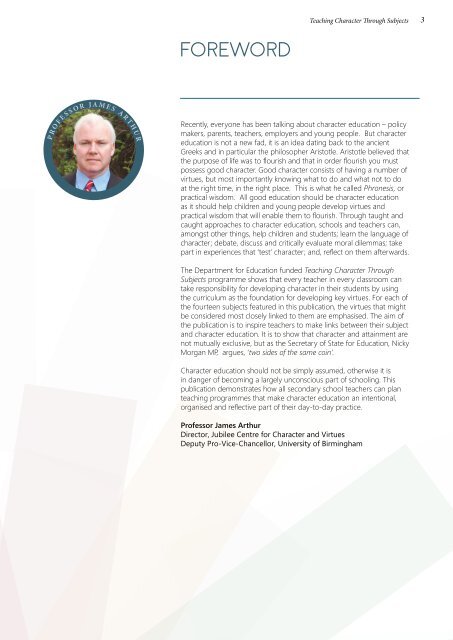INTELLECTUAL
Teaching_Character_Through_Subjects
Teaching_Character_Through_Subjects
Create successful ePaper yourself
Turn your PDF publications into a flip-book with our unique Google optimized e-Paper software.
Teaching Character Through Subjects<br />
3<br />
FOREWORD<br />
P R O F E S S O R<br />
J A M E S<br />
A R T H U R<br />
Recently, everyone has been talking about character education – policy<br />
makers, parents, teachers, employers and young people. But character<br />
education is not a new fad, it is an idea dating back to the ancient<br />
Greeks and in particular the philosopher Aristotle. Aristotle believed that<br />
the purpose of life was to flourish and that in order flourish you must<br />
possess good character. Good character consists of having a number of<br />
virtues, but most importantly knowing what to do and what not to do<br />
at the right time, in the right place. This is what he called Phronesis, or<br />
practical wisdom. All good education should be character education<br />
as it should help children and young people develop virtues and<br />
practical wisdom that will enable them to flourish. Through taught and<br />
caught approaches to character education, schools and teachers can,<br />
amongst other things, help children and students; learn the language of<br />
character; debate, discuss and critically evaluate moral dilemmas; take<br />
part in experiences that ‘test’ character; and, reflect on them afterwards.<br />
The Department for Education funded Teaching Character Through<br />
Subjects programme shows that every teacher in every classroom can<br />
take responsibility for developing character in their students by using<br />
the curriculum as the foundation for developing key virtues. For each of<br />
the fourteen subjects featured in this publication, the virtues that might<br />
be considered most closely linked to them are emphasised. The aim of<br />
the publication is to inspire teachers to make links between their subject<br />
and character education. It is to show that character and attainment are<br />
not mutually exclusive, but as the Secretary of State for Education, Nicky<br />
Morgan MP, argues, ‘two sides of the same coin’.<br />
Character education should not be simply assumed, otherwise it is<br />
in danger of becoming a largely unconscious part of schooling. This<br />
publication demonstrates how all secondary school teachers can plan<br />
teaching programmes that make character education an intentional,<br />
organised and reflective part of their day-to-day practice.<br />
Professor James Arthur<br />
Director, Jubilee Centre for Character and Virtues<br />
Deputy Pro-Vice-Chancellor, University of Birmingham


